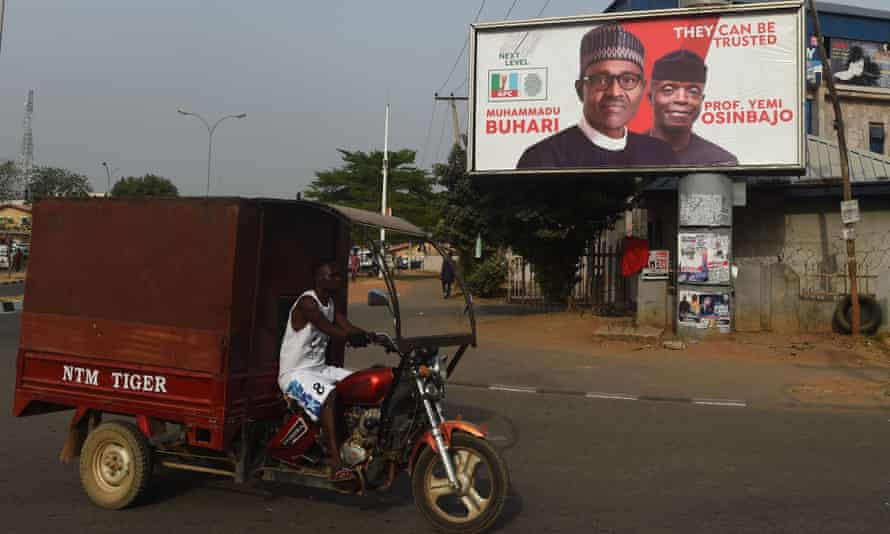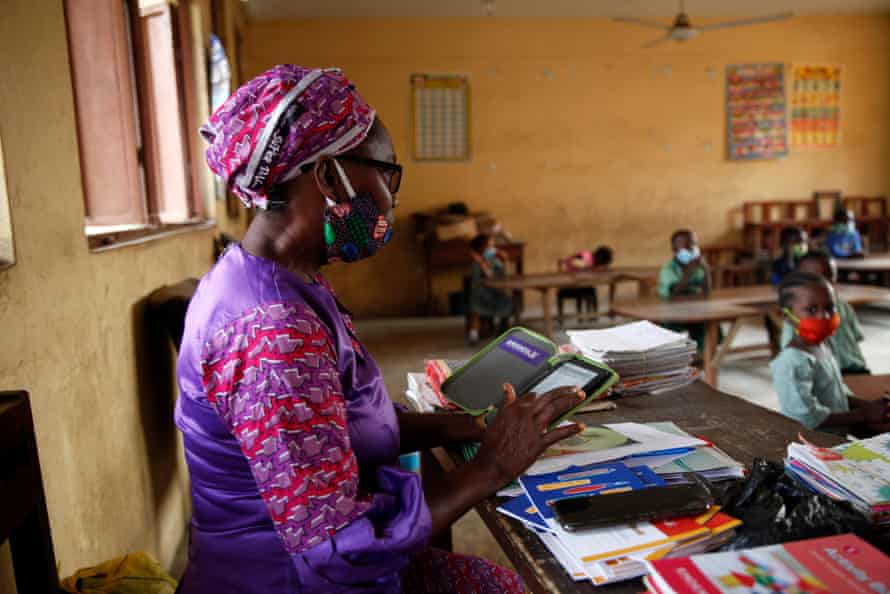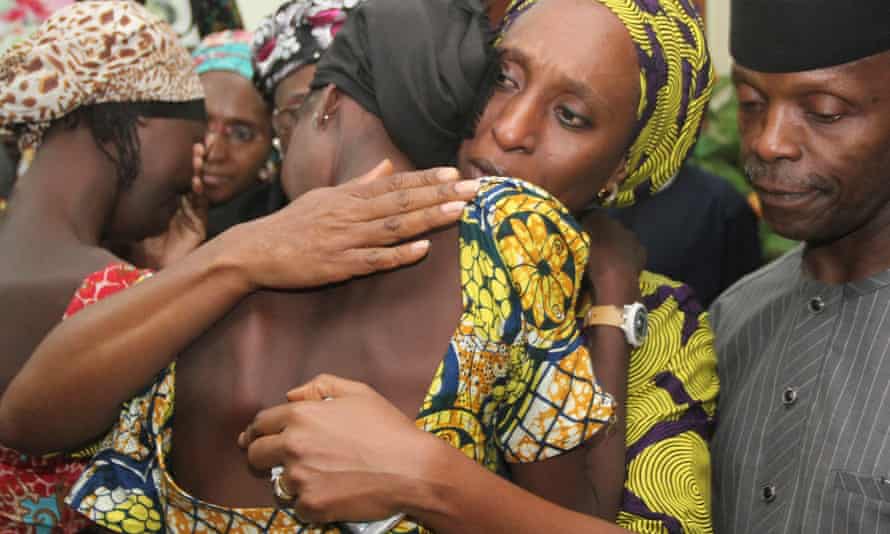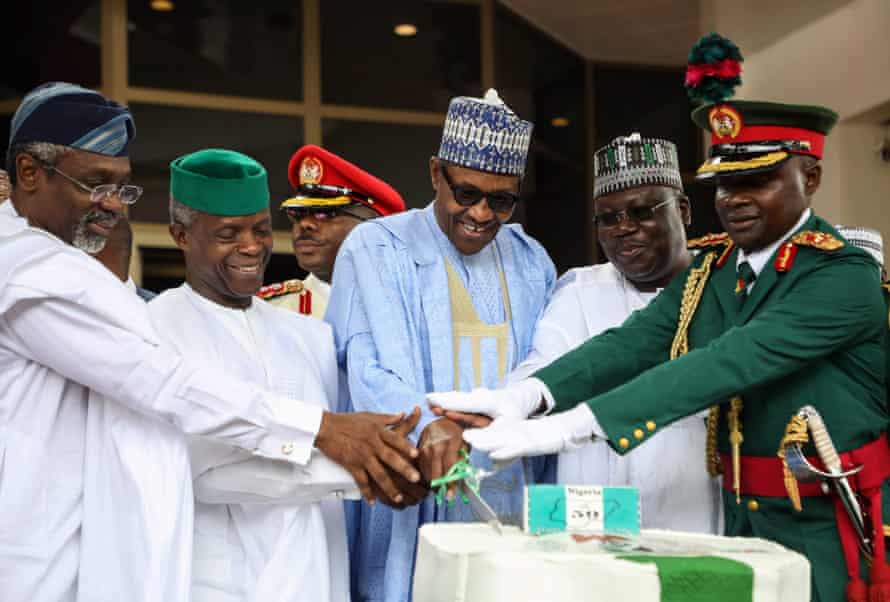Analysis: Buhari’s deputy wants to create jobs, feed pupils and cut red tape. Is he too high-profile for his critics?

The role of vice-president is one that John Adams, the first person in the US to hold the position, called “the most insignificant office that ever the invention of man contrived”.
Nigeria’s Patience Jonathan captured the situation in her sarcastic response to a journalist who asked about her husband, Goodluck Jonathan, when he was vice-president. She said: “He is in his office reading newspapers.”
But in the past few years, Nigeria’s current deputy, Yemi Osinbajo, has defied the normal expectations by spearheading a number of projects aimed at making life a bit easier for people in a country where daily existence is hard.
“I think it is worth commending the vice-president in the sense that development initiatives normally tend to spring from the workbook of aid agencies,” said Obadiah Mailafia, an economist. “But we have these that are homegrown.”
In mid-2016, Mercy Izuagba passed an aptitude test that qualified her for a job with the Nigerian government. She had graduated in industrial chemistry as one of the top students in her university in 2008, but had struggled to find meaningful employment in a country where people usually require “long leg” – connections to someone who knows someone who knows someone.
“I’d been taking aptitude tests for government jobs and doing well, but nobody would employ me,” said the 36-year-old, who lives in the capital,Abuja. “Some were willing to give employment but wanted you to bribe them first.”
Izuagba was posted to a public secondary school to teach science from 2016 to 2020, in a scheme overseen by Osinbajo, aimed at unemployed university graduates, part of a broader Nigerian youth unemployment and development scheme, N-Power. There she has won “best teacher” awards.

The N-Power project has so far employed about 500,000 Nigerian graduates in education, agriculture, and technology, according to government reports. The roughly $100 (£70) monthly salary can go a long way in a country where the World Bank reports that almost half of its 200 million population lives on less than a dollar a day.

Other projects spearheaded by Osinbajo include: Ease of Doing Business, Home Grown School Feeding Programme, MSME (Micro,Small and Medium Enterprises) Clinics, and the National Social Register.
“These projects were all conceptualised, incubated and implemented in the office of the vice-president,” said Lanre Shasore, who is in charge of planning in Osinbajo’s office. “The execution began here, before they were institutionalised elsewhere, like in the ministry of humanitarian affairs. Our office continues to work closely with relevant ministries.”
She emphasised that these initiatives were fully led by Nigerians and funded by taxpayers, particularly striking in a continent of countries largely dependent on foreign expertise and aid for development.
Adigun Agbaje, a governance and policy expert and politics professor at the University of Ibadan, in south-west Nigeria, said: “We have the human capacity both within the country and all over the world to take on these apparently intractable challenges and offer solutions. It is another step forward that we are now tapping from our own expertise; and the courage of the leadership of the current government to tap into that rather than flying in professors from Oxford University, British and American so-called experts.”
The aim of Ease of Doing Business is to remove the bottlenecks that make it tough to establish and run a business in Nigeria. One of its key alleviations is that visitors can now apply online before boarding a flight, then receive their visa on arrival in the country. This replaces the tortuous and unpredictable interactions with Nigerian embassies, which are notorious for irritating foreign investors. Between 2016 and 2020, Nigeria rose 39 places in the World Bank’s Ease of Doing Business Index.
Then there was the school feeding programme, giving one meal a day for millions of pupils in thousands of government schools across the country. It addresses malnutrition and encourages school attendance, boosts the economy by using produce grown by farmers in a school’s locality, and creates catering and food handling jobs. And it is Nigerian.
Another project brings together small businesses in different states to meet government agencies that can resolve bureaucratic issues on the spot. Shared facilities and infrastructure can also be provided. In the north-central state of Benue, for example, yam farmers rent space in a large barn rather than struggle to maintain their own. In the commercial capital state of Lagos, tailors can rent specialised machinery.

The National Social Register is Nigeria’s first attempt to create a database of the country’s poorest people, who then receive a lifetime monthly payment of 5,000 naira (£9). Following its inception in 2016, it now has about five million names, according to Shasore, as the work of identification and recording continues.
“At the national level, this is the first time Nigeria has had this kind of structured interventions, in terms of the scale, structure, and diversity of people touched or meant to be touched,” Agbaje said.
However, not all the vice-president’s efforts have received praise. The Government Enterprise and Empowerment Programme – giving micro businesses access to credit, sometimes in amounts as low as 10,000 naira – was viewed with suspicion when the loans were rolled out close to the 2019 presidential elections.
“The concept is good but you shouldn’t do it in a way that makes people feel that you are doing it just to curry favour,” said Mailafia, who was a presidential election candidate himself. “People started saying that it was more like a bribe for voting.”
Osinbajo’s diligence in the office may have something to do with his background. The 64-year-old is a professor and lawyer, with years of public-service experience as the attorney general of Lagos. He is also a long-serving pastor in one of Nigeria’s most popular mega-churches, the Redeemed Christian Church of God. Dolapo, his wife of 32 years, is the granddaughter of Obafemi Awolowo, one of Nigeria’s founding fathers and most notable statesmen. She generally stays out of the spotlight but organises philanthropic projects targeted at widows and against gender-based violence, and is usually the least flamboyantly dressed whenever the wives of public officials gather at functions.

“Here you have a man of ideas, marrying that into his role as a man of action, not afraid to bring the ideas to the table, not afraid to pursue the ideas in the realm of action,” Agbaje said. “He has also shown a level of transparency and a level of honesty in dealing with his principal, the president. All of that has helped.”
Mailafia, who ran against President Muhammadu Buhari in 2019, said: “Every politician has ambition but this vice-president has not allowed his ambition to cloud his sense of focus. I think Mr President is lucky to have someone like him.”
Osinbajo has publicly ascribed his successes to the president. In response to the Covid-19 pandemic, Buhari asked him to oversee an economic sustainability plan, which among other strategies to protect livelihoods, has paid monthly stipends to the urban poor, and salaries to staff in private education and transport businesses.
“What the president wanted was to pay every private-sector employee [in these sectors] but the cost was humongous so we had to rationalise,” Osinbajo said this month. “It is good that most people have received the payment. By the time I report back to the president, it will encourage him.”

Agbaje worries that Osinbajo’s impact could elicit negative reactions from politicians and presidential allies, who may feel that the vice-president has been getting too visible and too involved. “They have to some extent recorded some negative success in the sense that there have been all kinds of stories surrounding some of these initiatives and railroading them under a new ministry and all kinds of institutional infighting,” he said.
Whatever happens, even critics agree that Osinbajo has bucked the trend of using the Nigerian vice-presidency as a time to sit in his office reading newspapers, or waiting patiently for the president to die.
“You can create a Nigeria for all, not just for party people, or people from your local government or region or ethnic group,” Agbaje said. “It means that those in office can actually work to impact directly on the people, and not just on their party members and their loyalists and those who are following them.”
Adaobi Tricia Obinne Nwaubani is a Nigerian novelist. Her debut book I Do Not Come to you by Chance,won a 2010 Commonwealth Writers’ Prize


















